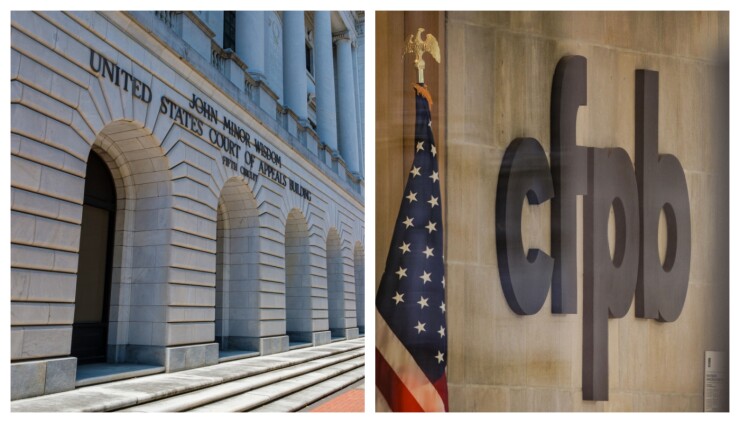The Consumer Financial Protection Bureau again faces an existential threat in the courts — this time over whether the agency’s funding by the Federal Reserve System is constitutional.
Earlier this month, five judges on the U.S. Court of Appeals for the Fifth Circuit
The opinion is not binding, and the five judges represent less than a third of the 17 active judges on the Fifth Circuit Court of Appeals. Still, a decision by the Second Circuit Court of Appeals in another

Compared with past legal challenges to the CFPB, the cases winding their way through appeals courts stand a better chance of disbanding the agency entirely and invalidating every action the bureau has taken since it was created in the Dodd-Frank Act of 2010, lawyers say.
“This is another big storm cloud for the CFPB,” said Alan Kaplinsky, senior counsel at Ballard Spahr. “If a court finds that the appropriations language is unconstitutional, that really puts the CFPB into danger.”
Two years ago, the Supreme Court
The reason is that Congress included in Dodd-Frank what is known as a severability clause, which allowed certain provisions that were found to be illegal to be struck down while the statute could remain.
In a split 5-4 decision, Chief Justice John Roberts found that a sitting president can fire the CFPB director for any reason. The result was that the so-called “for cause” provision in Dodd-Frank was simply removed. The agency's past actions were then
But there is no severability clause for the CFPB’s funding mechanism. If an appeals court were to find that the CFPB’s source of funds is unconstitutional, it would be a far more serious threat to the agency’s viability, lawyers said.
“It is likely that eventually the Supreme Court will have to decide the funding issue eventually,” said Rich Samp, senior litigation attorney at the New Civil Liberties Alliance, a nonprofit law firm that litigates against federal administrative agencies.
Samp said he has been advising targets of recent CFPB enforcement actions to challenge the bureau’s funding mechanism.
In the Fifth Circuit case, the concurring opinion of the five judges who objected to the CFPB’s funding mechanism has no binding effect but could influence other cases, Samp said. Three of the five judges who found the funding structure unconstitutional were appointed by former President Donald Trump.
U.S. Circuit Judge Edith Jones, who was appointed by former President Ronald Reagan, wrote that if Congress allows the CFPB's funding structure to remain, there will be no limits to the appropriations process being bypassed.
"Congress may no more lawfully chip away at its own obligation to regularly appropriate money than it may abdicate that obligation entirely," Jones wrote. "If the CFPB’s funding mechanism survives this litigation, the camel’s nose is in the tent. When conditions are right, the rest will follow."
Still, the judges found that the CFPB can continue to litigate a 2016
“The five judges opined that in fact the CFPB continues to be unconstitutional because of this funding mechanism, and that issue would probably be much more important than what was addressed in the Seila Law decision,” Samp said. “I personally think it is, and it’s an issue we are raising in the Second Circuit.”
Defenders of the CFPB note that as a banking regulator, the CFPB is hardly alone in being free from congressional purse strings.
Every other federal banking regulator — including the Federal Deposit Insurance Corp., the Office of the Comptroller of the Currency, the Federal Reserve and the Federal Housing Finance Agency — is funded by exam fees or other sources such as deposit insurance assessments. Those funding mechanisms were designed primarily to make the agencies independent and free from the political process.
Republican lawmakers have recently taken up the latest legal challenge to the CFPB, raising concerns in hearings about the fact that the agency is not subject to the appropriations process. Republican lawmakers appear to be teeing up bills to address the bureau’s funding source.
Some lawmakers have said the CFPB is not a prudential regulator, and argued that its funding structure should instead be similar to those of the Federal Trade Commission and the Securities and Exchange Commission, which receive congressional appropriations.
“The questioning you're getting from many members is warranted because the CFPB, unlike other independent agencies such as the SEC or FTC, aren't dependent on the congressional appropriations process,” Rep. Bryan Steil, R-Wis., told CFPB Director Rohit Chopra last month at a House Financial Services Committee hearing.
In fiscal 2021, the CFPB requested $596 million of the $717.5 million available in transfers from the Fed.
Kaplinsky said that even if Congress were to amend Dodd-Frank — an impossibility given the body’s partisan fractures — there may be no way to save the CFPB’s past actions.
“I think it’s a real worry at the bureau now, how is this all going to play out,” Kaplinsky said.




